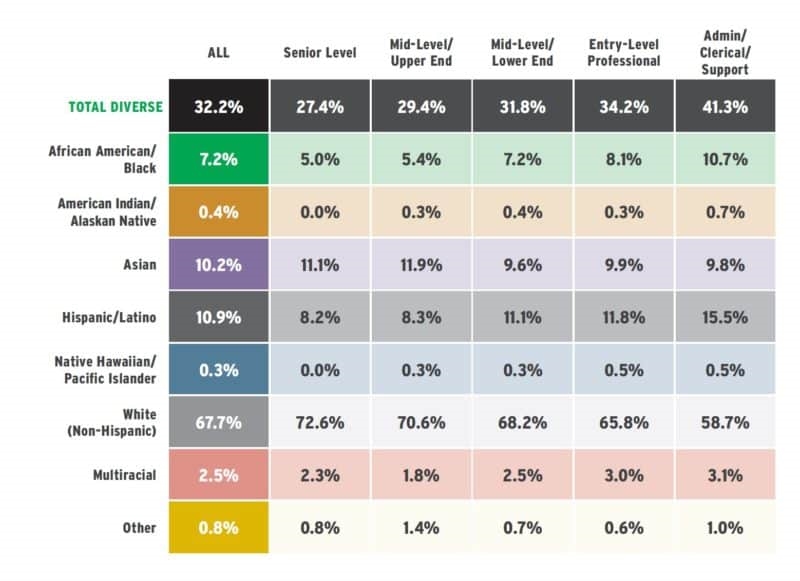The benefits of diversity and inclusion can be seen in stock and revenue performance, hiring and retention and customer acquisition and loyalty.
While marketing organizations’ ethnic diversity continues to improve overall, it shrinks as you go up the org chart, according to a new survey by the ANA.
Why we care. Diversity at all levels of a company is a major indicator of company success and productivity. The benefits of diversity and inclusion can be seen in stock and revenue performance, hiring and retention and customer acquisition and loyalty. A diverse marketing organization aids access to diverse markets.
Some 29.1% of those surveyed in the marketing/advertising industry this year identified as African American/Black, Asian, Hispanic/ Latino, American Indian/Alaskan Native and/or Native Hawaiian/ Pacific Islander. That’s up 1.9% from last year’s 27.2% and up 3% from 26% in 2018, the first year the ANA conducted the survey.

Specifically, the industry is 7.2% African American/Black,10.2% Asian, and 10.9% Hispanic/ Latino. African American/Black and Hispanic/Latino both increased notably from last year (6.6% and 8.9% respectively) However, as the report notes, “representation for both is still significantly lower than their proportion of the U.S. population (at 12.1% and 18.7%, respectively).”
While the number of Asians declined to 10.2% from 11.7% last year, it is still significantly higher than its proportion of the U.S. population (5.9%).
African American/Black people make up 10.7% of the admin/clerical workers in the industry and only 5% of those in senior leadership positions. For Hispanics the decline is even steeper, going from 15.5% to 8.2%. This trend is reversed for Asians who make up 9.8% of the admin/clerical workers and 11.1% of those in senior positions.
The report notes that while more effort is needed to increase diversity, what we’re seeing now is a reflection of demographic changes and current diversity initiatives. “[This] is not a surprise given that the younger U.S. population skews more multicultural than the older U.S. population and also because corporate America’s efforts to diversify the talent pipeline have shown progress.”
Gender inequality. In terms of gender, the industry continues to be overwhelmingly female, with women making up 67.5% of the workforce. Unfortunately, this number also declines the more senior the position is. While men are 32.4% of marketing/advertising organizations, they have 44.2% of the senior level positions.
Methodology. For the survey, the ANA asked member company individuals who create accounts to voluntarily and anonymously answer questions to identify their gender and ethnicity. For the three-year period between July 1, 2019 and June 30, 2022, 32,623 marketers responded to the gender question and 29,194 to the ethnicity question. The respondent base consists of client-side marketer members and marketing solutions provider members. In the 2021 report, 31,790 marketers responded to the gender question and 28,862 to the ethnicity question.
The post Marketing industry diversity improving, but still lags for senior positions appeared first on MarTech.
(18)
Report Post






